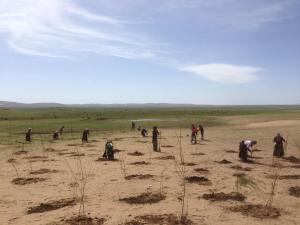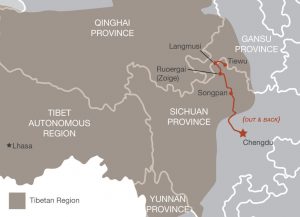 Herding yaks on Tibet’s uplands is helping to save the wetlands from desertification.
Herding yaks on Tibet’s uplands is helping to save the wetlands from desertification.
A report by chinadialogue – an independent organisation dedicated to promoting understanding of China’s urgent environmental challenges – details the decline in the wetlands and lakes of Zoigê county, situated at an altitude of 3,500 metres and the meeting point of the Sichuan, Gansu and Qinghai provinces. It is one of China’s three largest wetland ecosystems and the world’s largest high-altitude marsh.
The Sichuan Desertification Monitoring Centre reported in 2009 that more than 200 high-altitude lakes there had dried up and 46,700 hectares of grassland had become desert. More is at risk of desertification.
Human activity is in part to blame for this. The land had been overgrazed and then in the 1970s work started on digging 200 kilometres of ditches in order to drain 1,400 square kilometres of wetland and turn it to much needed pasture. This was still ongoing in the 1990s. The local mining industry has also played a part: gold miners use cloud-seeding cannons to reduce rainfall and this is now affecting the efforts to reverse the desertification.
Over the past seven years local herders have been planting grass and some areas are now beginning to turn green again. Shelterbelts of trees, windbreaks made from straw, and the mixed planting of good quality fodder all had some benefit, but with only partial success. It is difficult to establish growth in the desert as seeds are blown away and do not have water to initiate germination.
 Then one of the project leaders heard two women chatting and commenting that yaks are heavy, and “couldn’t they tread the seeds deeper into the soil?” He realised this was true – and that yak dung would make a good fertiliser. Now yaks are let into fenced-off areas for an evening to tread down the seeds and it has been shown that an appropriate level of herding can help degraded grasslands recover quicker.
Then one of the project leaders heard two women chatting and commenting that yaks are heavy, and “couldn’t they tread the seeds deeper into the soil?” He realised this was true – and that yak dung would make a good fertiliser. Now yaks are let into fenced-off areas for an evening to tread down the seeds and it has been shown that an appropriate level of herding can help degraded grasslands recover quicker.
The Chinese Academy of Sciences at Chengdu Institute of Biology has studied the desertification of the grasslands in Zoigê and found that moderate grazing helps accelerate restoration and this model is being replicated elsewhere.




 Print
Print Email
Email